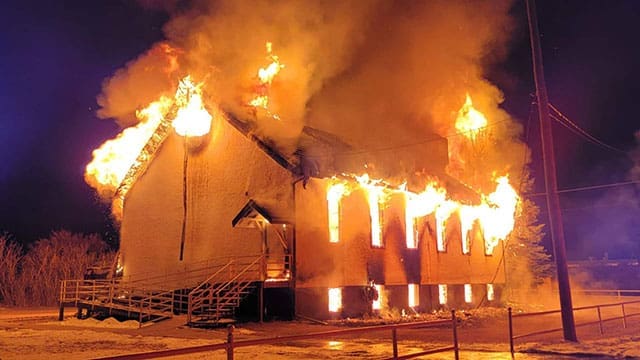A new Blood Libel is spreading in Canada, fueling anti-Catholic hate, misinformation, and church burnings

For interview requests, click here
Imagine a documentary that falsely accuses a religious group of committing horrific crimes—murdering children, covering up the evidence, and engaging in a generations-long conspiracy. Now, imagine that documentary being praised by politicians and the media and nominated for an Academy Award. Imagine it being shown in schools as fact.
Unthinkable? It’s happening in Canada today.
A film called Sugarcane, which pushes an unproven and inflammatory accusation against Catholic priests, is being hailed as a triumph despite providing no real evidence. It mirrors the infamous Blood Libel—the false claim that Jews killed Christian children for religious rituals—a lie that incited centuries of violence and pogroms and even contributed to the Holocaust.
Just as the Blood Libel was used to justify hatred and persecution against Jews, Sugarcane and similar narratives are fuelling anti-Catholic sentiment, government waste, and even church burnings.
 |
| Recommended |
| Acclaimed documentary Sugarcane distorts the truth
|
| What really happened to the children of Indian Residential Schools?
|
| Report urges balanced view of Residential Schools legacy
|
Sugarcane, nominated for an Academy Award, falsely claims that Catholic priests at a British Columbia residential school impregnated female students and burned their babies in an incinerator. This claim has no supporting evidence. The documentary manipulates viewers by telling the tragic but unrelated true story of Antoinette Archie, an Indigenous woman who abandoned her newborn in a residential school incinerator. The baby survived, was raised as Ed Noisecat, and later fathered Julian Noisecat, one of the documentary’s creators.
Archie was 20 years old at the time and had not been a student at the school for years. The father was not a priest but an Indigenous man, Ray Peters, who fathered several of her children. The film misleads audiences into believing the case was part of a broader pattern of priestly abuse yet provides no evidence of such a pattern.
Another segment of the documentary references a priest who had a consensual relationship with a 22-year-old Indigenous woman who worked at the school. There is also an individual who suspects—without proof—that his father was a priest. However, nothing in Sugarcane substantiates the claim that priests systematically impregnated Indigenous students and incinerated their babies.
This is more than a misleading documentary—it is a modern version of the Blood Libel, replacing Jewish victims with Catholics. Both are malicious fabrications designed to incite hatred against a religious group.
Under Section 319(2) of Canada’s Criminal Code, it is a crime to willfully promote hatred against an identifiable group. Yet Sugarcane is widely celebrated, its makers hailed as heroes, and its misleading narrative accepted uncritically by politicians, the media, and Hollywood.
This documentary is not the only example of anti-Catholic libel being treated as fact. The Kamloops Indian Band’s May 27, 2021, claim that it had discovered the “remains of 215 Indigenous children” in unmarked graves at a former residential school was widely accepted without evidence. The reality? They found ground-penetrating radar anomalies—not bodies, graves, or remains. Despite the unproven claim, the Kamloops Band received $12 million for excavation, yet no bodies have been found.
Similarly, Chief Willie Sellars of Williams Lake alleged that priests at a local residential school routinely tortured, raped, and murdered students before discarding their bodies in rivers, lakes, and incinerators. He further claimed that for decades, every Canadian prime minister, bishop, and RCMP official conspired to cover up these crimes.
Despite the improbability of such a conspiracy, the federal government awarded Williams Lake $9 million. Yet, as in Kamloops, no remains have been found, and no excavations have been undertaken. The Trudeau government allocated $320 million to investigate unmarked graves, leading to increasingly outlandish claims, none of which have been substantiated. Meanwhile, churches have been burned across Canada in response to these baseless allegations, with little condemnation from political leaders.
While the antisemitic Blood Libel has largely been relegated to the dustbin of history, its anti-Catholic counterpart is alive and well in Canada. Catholic leaders, afraid of offending Indigenous groups, remain silent. Meanwhile, Indigenous voices who know the truth—that priests and nuns served their communities honourably—are ignored.
Canada will soon hold an election, and Pierre Poilievre has called for a full investigation into the unmarked graves controversy, stating:
“[Ottawa] should provide the resources to allow for a full investigation into the potential remains at residential schools.”
This is a sensible step, but Canada needs to go further. A full public inquiry is necessary, not just to investigate unmarked graves but to examine the broader anti-Catholic misinformation spread by Sugarcane and others.
This inquiry should also investigate the hundreds of church burnings that have occurred since the Truth and Reconciliation Commission (TRC) began promoting the narrative of “thousands of missing children.” The arson attacks surged after the May 27, 2021, Kamloops claim, which was inspired by TRC misinformation. If the government values reconciliation, it must confront misinformation, not just accept narratives.
The promotion of hatred against Catholics—or any group—has no place in Canada. The Blood Libel led to centuries of persecution, violence, and mass killings. The modern anti-Catholic libel is now fueling hysteria, financial fraud, and church burnings.
We must ensure historical truth prevails over propaganda. Sugarcane is not a work of journalism or justice—it is a dangerous piece of political propaganda that deserves scrutiny, not praise.
Brian Giesbrecht is a retired judge and a Senior Fellow at the Frontier Centre for Public Policy.
Explore more on Residential schools, Propaganda, Law, Hate crimes, Trudeau government
The views, opinions, and positions expressed by our columnists and contributors are solely their own and do not necessarily reflect those of our publication.
Troy Media is dedicated to empowering Canadian community news outlets by providing independent, insightful analysis and commentary. Our mission is to support local media in fostering an informed and engaged public by delivering reliable content that strengthens community connections, enriches national conversations, and helps Canadians better understand one another.


